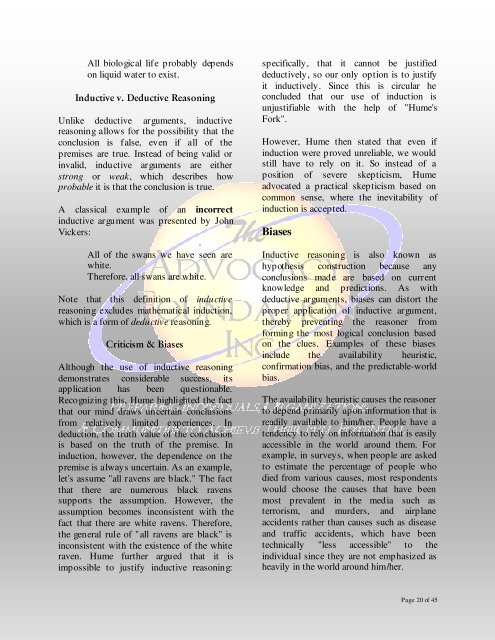Critical Thinking for Transformative Justice
Critical Thinking for Transformative Justice
Critical Thinking for Transformative Justice
You also want an ePaper? Increase the reach of your titles
YUMPU automatically turns print PDFs into web optimized ePapers that Google loves.
All biological life probably depends<br />
on liquid water to exist.<br />
Inductive v. Deductive Reasoning<br />
Unlike deductive arguments, inductive<br />
reasoning allows <strong>for</strong> the possibility that the<br />
conclusion is false, even if all of the<br />
premises are true. Instead of being valid or<br />
invalid, inductive arguments are either<br />
strong or weak, which describes how<br />
probable it is that the conclusion is true.<br />
A classical example of an incorrect<br />
inductive argument was presented by John<br />
Vickers:<br />
All of the swans we have seen are<br />
white.<br />
There<strong>for</strong>e, all swans are white.<br />
Note that this definition of inductive<br />
reasoning excludes mathematical induction,<br />
which is a <strong>for</strong>m of deductive reasoning.<br />
Criticism & Biases<br />
Although the use of inductive reasoning<br />
demonstrates considerable success, its<br />
application has been questionable.<br />
Recognizing this, Hume highlighted the fact<br />
that our mind draws uncertain conclusions<br />
from relatively limited experiences. In<br />
deduction, the truth value of the conclusion<br />
is based on the truth of the premise. In<br />
induction, however, the dependence on the<br />
premise is always uncertain. As an example,<br />
let's assume "all ravens are black." The fact<br />
that there are numerous black ravens<br />
supports the assumption. However, the<br />
assumption becomes inconsistent with the<br />
fact that there are white ravens. There<strong>for</strong>e,<br />
the general rule of "all ravens are black" is<br />
inconsistent with the existence of the white<br />
raven. Hume further argued that it is<br />
impossible to justify inductive reasoning:<br />
specifically, that it cannot be justified<br />
deductively, so our only option is to justify<br />
it inductively. Since this is circular he<br />
concluded that our use of induction is<br />
unjustifiable with the help of "Hume's<br />
Fork".<br />
However, Hume then stated that even if<br />
induction were proved unreliable, we would<br />
still have to rely on it. So instead of a<br />
position of severe skepticism, Hume<br />
advocated a practical skepticism based on<br />
common sense, where the inevitability of<br />
induction is accepted.<br />
Biases<br />
Inductive reasoning is also known as<br />
hypothesis construction because any<br />
conclusions made are based on current<br />
knowledge and predictions. As with<br />
deductive arguments, biases can distort the<br />
proper application of inductive argument,<br />
thereby preventing the reasoner from<br />
<strong>for</strong>ming the most logical conclusion based<br />
on the clues. Examples of these biases<br />
include the availability heuristic,<br />
confirmation bias, and the predictable-world<br />
bias.<br />
The availability heuristic causes the reasoner<br />
to depend primarily upon in<strong>for</strong>mation that is<br />
readily available to him/her. People have a<br />
tendency to rely on in<strong>for</strong>mation that is easily<br />
accessible in the world around them. For<br />
example, in surveys, when people are asked<br />
to estimate the percentage of people who<br />
died from various causes, most respondents<br />
would choose the causes that have been<br />
most prevalent in the media such as<br />
terrorism, and murders, and airplane<br />
accidents rather than causes such as disease<br />
and traffic accidents, which have been<br />
technically "less accessible" to the<br />
individual since they are not emphasized as<br />
heavily in the world around him/her.<br />
Page 20 of 45

















